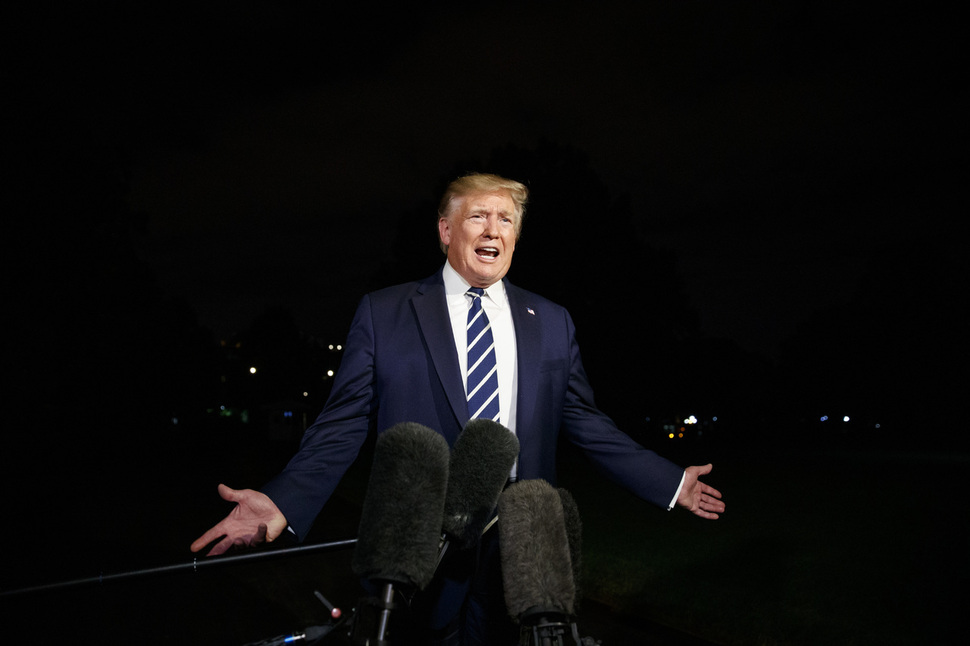 |
|
US President Donald Trump fields questions from reporters before leaving the White House to attend the G7 summit in France on Aug. 23.
|
US likely to push the S. Korean government to “reconsider” its decision to scrap intelligence-sharing agreement with Japan
Though the Blue House said on Aug. 22 that the US had shown “understanding” about its decision to terminate an intelligence-sharing agreement with Japan, not only the US government but also Congress have publicly voiced their dissatisfaction with the decision for several days in a row. It’s widely believed that the US means to ask the South Korean government to reconsider its decision to pull out of the General Security of Military Information Agreement (GSOMIA) before that decision goes into effect on Nov. 23. Sources in the South Korean government told the Hankyoreh on Aug. 27 that even as the US expressed its “disappointment” and “concerns” about South Korea’s decision to terminate GSOMIA in public, it was sending the same message through the two countries’ diplomatic channels. “There’s no difference between the message in the public statement and the message exchanged on a bilateral level,” said a government official who is well-informed about communication between the two countries. That implies that the US is using diplomatic channels to send South Korea messages akin to the one made by US State Department Spokesperson Morgan Ortagus on Aug. 25: “We are deeply disappointed and concerned that the ROK’s government terminated the General Security of Military Information Agreement.” US officials have continued to voice their discontent during the days since Seoul made its decision to scrap GSOMIA on Aug. 22. “I am deeply concerned by President Moon Jae-in’s decision to terminate the General Security of Military Information Agreement,” US House Committee on Foreign Affairs Chairman Rep. Eliot Engel was quoted as saying in a statement posted on the committee’s official website on Aug. 24. “At a time when the United States, Japan, and South Korea should be working together to counter North Korea’s provocative ballistic missile tests, Seoul’s decision undermines regional security,” Engel said. That echoes the message sent in an official position issued on Aug. 22, when the US State Department voiced “disappointment” and “strong concerns” about the Moon administration’s decision not to renew GSOMIA. On the same day, US Secretary of State Mike Pompeo personally said he was “disappointed.” Government officials and experts share the view that the US’ irritation derives from the fact that South Korea’s decision to terminate GSOMIA undermines the US’ mid- and long-term strategy of containing China. “The US is annoyed by the apparent escalation of the South Korea-Japan conflict. Even before the GSOMIA decision, the US had already signaled to South Korea that it shouldn’t make an ‘incorrect judgment,’” one government official said. “The GSOMIA termination is problematic for the fundamental architecture of the Asia-Pacific strategy with which the US hopes to contain China. As Prime Minister Lee Nak-yeon said, the US appears to think that there’s still time to reconsider GSOMIA and carry out related negotiations before Nov. 23. By continuing to express such strong dissatisfaction with this decision, the US appears to be urging the South Korean government to salvage the agreement,” said a source at a research institution funded by the South Korean government. Some experts maintain that Seoul ought to prioritize the national interest regardless of pressure from the US. “If trilateral cooperation between South Korea, the US, and Japan moves toward a ‘trilateral alliance’ against China, GSOMIA has to be scrapped, even if not for the current dispute. Considering that trilateral cooperation doesn’t come before the national interest, there’s no reason to maintain GSOMIA,” said a high-ranking official at a state-funded research institute. By Noh Ji-won and Seong Yeon-cheol, staff writers Please direct comments or questions to [english@hani.co.kr]






